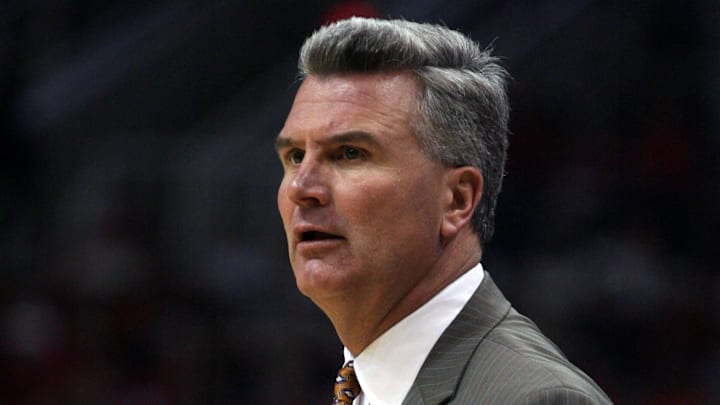On March 26, 2005, the Illinois basketball team etched its name into NCAA tournament lore with a breathtaking 90-89 overtime victory over the Arizona Wildcats in the Elite Eight.
Played at Allstate Arena in Rosemont, Illinois, the Illini, just 150 miles from the University of Illinois campus, came out victorious in what is known as one of the greatest comebacks in March Madness history.
The Athletic ranked it fourth among the top 25 men’s college basketball games of the 2000s; it trails only two national championship games and the iconic 2001 Maryland-Duke regular-season clash. For Illini fans, this game—dubbed the “Miracle on Mannheim”—remains a defining moment, its legacy enduring 20 years later.
The Stage and Atmosphere
The Allstate Arena was a sea of orange, with approximately 21,900 of the 22,000 fans cheering for the top-ranked Illini. Illinois entered the game with a 35-1 record, having lost only to Ohio State in the regular-season finale.
The Illini were led by a dynamic trio of All-American guards—Deron Williams, Dee Brown, and Luther Head— and were a powerhouse, having started the season 29-0 and earning a No. 1 ranking after defeating Wake Forest. Arizona, with a 30-7 record, was no slouch, featuring stars like Channing Frye and Hassan Adams, and learning under coach Lute Olson. The stage was set for a high-stakes showdown, with a Final Four berth on the line.
The Game’s Dramatic Arc
Illinois started strong, leading 31-25 at the end of the first half, thanks to sharp shooting, as they hit 7-of-13 three-pointers. However, Arizona seized control, building a commanding 75-60 lead with just four minutes remaining in regulation. The Wildcats, powered by Frye’s 24 points and 12 rebounds on 11-of-14 shooting, seemed poised to advance. Illinois coach Bruce Weber later admitted, “We had no answers,” while Arizona’s assistant coach Josh Pastner recalled the arena falling silent, as if the Illini faithful had “seen a ghost.”
Then, the improbable began. Head ignited the comeback with a three-pointer at the 3:18 mark, cutting the lead to 11. With 45 seconds left, Dee Brown stole the ball and scored a layup, narrowing the gap to three points. Jack Ingram tipped an inbounds pass, setting up Deron Williams for a clutch three-pointer with 39 seconds remaining, tying the game at 80-80. In overtime, Williams, despite battling cramps, hit two more three-pointers, finishing with 30 points. Arizona’s final shot fell short at the buzzer, and Illinois secured the 90-89 victory.
🎥 𝙏𝙝𝙚 𝘾𝙤𝙢𝙚𝙗𝙖𝙘𝙠
— Illinois Men's Basketball (@IlliniMBB) December 10, 2021
March 26, 2005 - Illinois vs. Arizona #Illini | #EveryDayGuys pic.twitter.com/sf4V5hUO7d
Emotional Context
The emotional stakes of this game were profound. Weber was grieving the recent loss of his mother during the Big Ten Tournament, adding personal weight to the team’s postseason run. In the Sweet 16, Illinois had faced Wisconsin-Milwaukee, coached by Bruce Pearl, a figure despised by Illini fans for secretly taping an Illinois player, Deon Thomas, in the 1990s, leading to NCAA probation.
This backdrop heightened the emotional intensity of the tournament. Additionally, comedian Bill Murray, a Chicago native, was a prominent supporter in the stands, adding a touch of celebrity flair to the Illini’s journey.
The Impact on Illinois
The victory propelled Illinois to its first Final Four since 1989 and only the second since 1952, a monumental achievement for a program that had started the season 29-0.
Without this win, the Illini risked being labeled underachievers despite their dominant regular season. The comeback galvanized the fanbase, with thousands greeting the team at their practice facility until 2-3 a.m. after the game. Although Illinois did advance to the national championship, where they fell to North Carolina, this Arizona game defined their legacy.
A Lasting Legacy
Twenty years later, the “Miracle on Mannheim” remains a cornerstone of Illinois basketball history. It's one of the greatest Elite Eight games ever.
Illinois vs Arizona on March 26, 2005, showcased the brilliance of Williams, Brown, and Head, cementing their status as Illini legends. For Arizona, the loss was crushing, marking Olson’s last genuine shot at a Final Four before his 2008 retirement.
Conclusion
The Illinois vs. Arizona Elite Eight game of 2005 was a masterclass in resilience, teamwork, and the magic of March Madness. It was a moment of triumph that transcended the court, uniting a community and etching a legacy that endures to this day. As one of the most iconic games of the 2000s, it continues to inspire, reminding us that in college basketball, no deficit is too large, and no dream is too distant.
